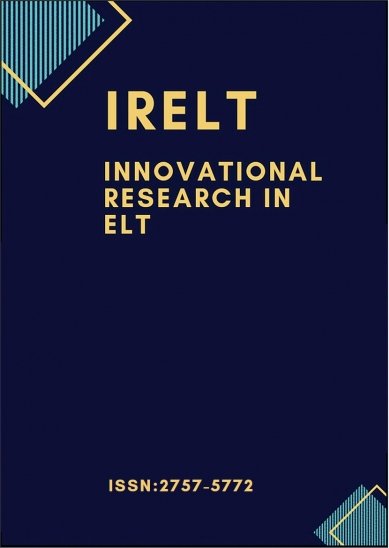Abednia, A., & Izadinia, M. (2013). “Critical pedagogy in ELT classroom: Exploring contributions of critical literacy to learners’ critical consciousness”. Language Awareness, 22 (4), 338-352. https://doi.org/10.1080/09658416.2012.733400
Aliakbari, M., & Faraji, E. (2011). “Basic principles of critical pedagogy”. 2nd International Conference on Humanities, Historical and Social Sciences IPEDR. October 21-23, Singapore. 78-85.
Arıkan, A. (2005). Age, gender and social class in ELT coursebooks: A critical study. Hacettepe Üniversitesi Eğitim Fakültesi Dergisi, 28(28), 29-38.
Crookes, G. (2012). Critical pedagogy in language teaching. The encyclopedia of applied linguistics, 1-9.
Crookes, G. V. (2013). Critical ELT in action: Foundations, promises, praxis. Routledge. Dahrendorf, R. (1958). Toward a theory of social conflict”. Journal of conflict Resolution, 2(2), 170-183. https://doi.org/10.1177/002200275800200204
Dant, T. (2003). Critical social theory: Culture, society and critique. Sage.
Darder, A., Baltodano, M. P., & Torres, R. D. (2003). The critical pedagogy reader. Psychology Press.
Ellis, R. (2003). Task-based language learning and teaching. Oxford University Press.
Freire, P. (2018). Pedagogy of the oppressed. Bloomsbury Publishing.
Ghahremani-Ghajar, S. S., & Mirhosseini, S. A. (2005). “English class or speaking about everything class? Dialogue journal writing as a critical EFL literacy practice in an Iranian high school”. Language, culture and curriculum, 18(3), 286-299.https://doi.org/10.1080/07908310508668748
Gray, J. (2010). The Branding of English and The Culture of the New Capitalism: Representations of the World of Work in English Language Textbooks. Applied Linguistics, 31(5), 714-733.
Giroux, H. A. (2003). Critical theory and educational practice. In T. Darder, M. P. Baltodano, & R. D. Torres (Eds.), The critical pedagogy reader (pp. 27-56). Psychology Press.
Gruenewald, D. A. (2003). The Best of Both Worlds: A Critical Pedagogy of Place. Educational Researcher, 32(4), 3–12.doi:10.3102/0013189x032004003
Guilherme, M. (2007). English as a global language and education for cosmopolitan citizenship. Language and Intercultural Communication, 7(1), 72-90. https://doi.org/10.2167/laic184.0
Harrington, A. (2005). Modern social theory. Oxford University Press.
Horkheimer, M. (1972). Critical theory: Selected essays (Vol. 1). A&C Black.
Khan, C. (2020). Fostering a critical consciousness in ELT: incorporating a women, gender and sexuality course in a bilingual education university program in Bogota, Colombia. Pedagogy, Culture & Society, 28(3), 403-420. https://doi.org/10.1080/14681366.2019.1649713
Kumaravadivelu, B. (2006). Understanding language teaching: From method to postmethod. Routledge.
Lather, P. (1998). Critical pedagogy and its complicities: A praxis of stuck places. Educational theory, 48(4), 487-497.
Luke, A., Luke, C., & Graham, P. (2007). Globalization, corporatism, and critical language education. International Multilingual Research Journal, 1(1), 1-13. DOI: 10.1080/19313150709336861
Malott, C. S. (2011). Critical pedagogy and cognition: An introduction to a postformal educational psychology. Springer Science & Business Media.
McLaren, P. (1999) Revolutionary pedagogy in post-revolutionary times: rethinking the political economy of critical education, Educational Theory, 48.
Mejía, A. (2004). The problem of knowledge imposition: Paulo Freire and critical systems thinking. Systems Research and Behavioral Science, 21(1), 63-82.doi:10.1002/sres.558
Melling, A., & Pilkington, R. (Eds.). (2018). Paulo Freire and transformative education: Changing lives and transforming communities. Springer.
Monchinski, T. (2008). Critical pedagogy in the everyday classroom. In Critical Pedagogy and the Everyday Classroom (pp. 115-139). Springer.
Nelson, N., & Chen, J. (2023). Freire’s problem-posing model: critical pedagogy and young learners. ELT Journal, 77(2), 132-144.
Okazaki, T. (2005). Critical consciousness and critical language teaching. University of Hawai'I Second Langauge Studies Paper 23(2). http://hdl.handle.net/10125/40676
Pathomchaiwat, L. (2021). Encouraging Critical Pedagogy in Thai ELT Classrooms. Journal of Man and Society Faculty of Humanities and Social Sciences, 6(2), 151-170.
Pennycook, A. (1995). English in the world/The world in English. In Power and inequality in language education. Cambridge University Press.
Pennycook, A. (2001). Critical applied linguistics: A critical introduction. Routledge. Reagan, T. G., & Osborn, T. A. (2001). The foreign language educator in society: Toward a critical pedagogy. Routledge.
Reagan, T. G., & Osborn, T. A. (2001). The foreign language educator in society: Toward a critical pedagogy. Routledge: UK.
Shah, S. F. (2012). Gender inclusion: A neglected aspect of the English textbooks in Pakistan. International Journal of Social Sciences & Education, 3(1).
Shin, J. K. (2004). The use of Freirian pedagogy in teaching English as an international language: Raising the critical consciousness of EFL teachers in Korea. LLC Review, 4(1), 64-82.
Silva, L. D., Farias, P. F., & D’Ely, R. C. S. F. (2018). Doing Critical English Language Teaching: Designing critical tasks to promote critical media literacy. Revista A Cor das Letras, Feira de Santana, 18, 99-121.
Silva, L. D. (2020). Critical tasks in action: the role of the teacher in the implementation of tasks designed from a critical perspective. Ilha do Desterro, 73, 109-127. Zehir Topkaya, E. & Demir, B. (2022). Critical Digital Literacy. In S. Kazazoğlu (Ed), Critical Reading and Writing in the 21st Century. Cambridge Scholars Publishing. ISBN: 978-1-5275-8385-6
|

